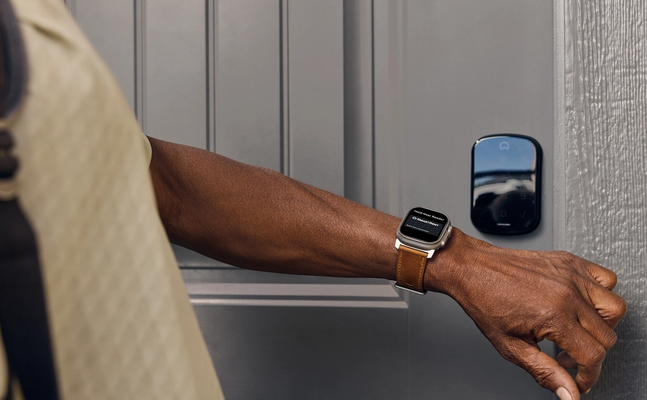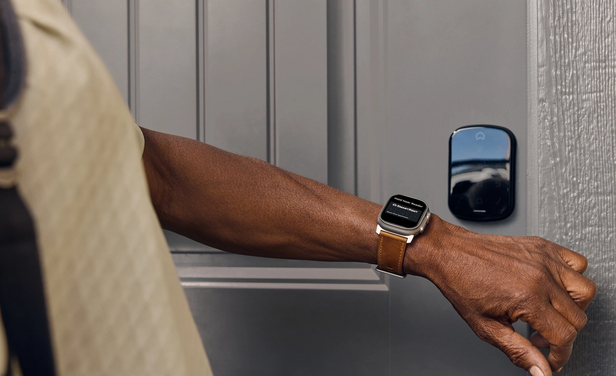The multifamily housing sector is transforming. What was once a traditional property management model is evolving into a more dynamic, service-driven approach—"home-as-a-service." By integrating smart technology and personalized services, this shift creates modern, seamless living experiences for residents while streamlining operations for property managers.
At the core of this evolution? Smart home technology. It’s redefining how multifamily communities function by improving individual units and enhancing the entire resident experience and property operations.

Effortless living, enhanced value
Today’s residents expect more than just a place to live—they want a space that offers unmatched convenience, personalization and control over their environment. Smart home technology makes this possible, allowing residents to automate everything from thermostats to lighting and security systems—all from a single app. Imagine waking up to a perfectly set temperature, your lights adjusting to your schedule and receiving real-time security alerts while you’re away. This level of control empowers residents to customize their living spaces in a way that supports their lifestyles.
This level of service isn’t just a perk—it’s a value proposition renters are willing to pay for. According to a Schlage and Wakefield Research survey, 86% of millennials would pay nearly 20% more for a smart apartment. As younger generations become the dominant renter demographic, their demand for tech-enabled living is only growing. This demand translates directly into higher property values, increased occupancy rates and stronger lease renewals for multifamily owners and operators.
Smart home technology doesn’t only provide convenience—it enhances safety. Features like smart locks, video doorbells and connected security systems offer residents peace of mind, which can translate into lower security concerns and overall better experiences.
For property owners, these upgrades may also reduce liability, offering protection in the event of security-related incidents. Additionally, these features can even lead to reduced insurance costs, benefiting property owners financially. Insurance providers are increasingly factoring in the security features of smart homes when determining premiums, potentially resulting in significant savings.
Streamlined operations, optimized staffing
For property managers, smart home platforms provide more than just resident convenience—they revolutionize operations. With a centralized system, property teams can manage access control, maintenance requests and energy efficiency from one interface. This consolidation reduces complexity and provides real-time insights into property operations, giving managers the tools to make faster, data-driven decisions. This streamlining reduces manual tasks, lowers operational costs and allows staff to focus on what matters most: resident satisfaction and retention.
The financial benefits are clear. NMHC reports that smart-home systems can increase annual net operating income (NOI) by as much as $135,000. These financial gains are driven by a combination of factors: reducing energy waste, more efficient maintenance workflows and the ability to offer value-added services like package management and self-guided tours. The result? A boost in both profitability and resident satisfaction.
Smart technology also plays a critical role in preventive maintenance. Leak detection sensors can flag potential issues before they escalate into costly problems. Smart thermostats optimize energy use, saving properties 10-15% in utility costs, according to the U.S. Department of Energy. By catching these issues early, properties not only save on maintenance costs but also reduce the risk of property damage, ultimately extending the lifespan of assets. These savings not only lower costs but also extend the life of property assets, providing a sustainable approach to management.
Staffing efficiency is another key benefit. Automated access control, self-guided tours and digital work order management reduce the burden on on-site teams. These tools not only cut labor costs but also improve response times and enhance resident experience. For leasing agents, self-guided tours offer a more flexible, scalable leasing process—prospective tenants can tour properties on their own time, increasing lead volume and ultimately boosting conversion rates. These technologies are also valuable for addressing staffing shortages, allowing properties to operate at higher efficiency with fewer resources.
Future-proofing multifamily living
"Home-as-a-service" isn’t just a trend—it’s the future of multifamily living. As technology continues to advance, resident expectations will only grow. Younger renters, in particular, are accustomed to seamless, tech-driven experiences in every area of life. Properties that fail to keep up risk losing ground in an increasingly competitive market.
By adopting smart home technology, property owners and operators can position their properties as modern, efficient and responsive to resident needs. Moreover, integrating smart features now makes it easier for properties to stay ahead of future technology trends, ensuring continued appeal to future generations of renters.
These technologies appeal to tech-savvy renters and support sustainability goals. Many cities are now incentivizing energy-efficient housing, and smart tech helps properties qualify for tax breaks, green certifications and long-term asset appreciation. With tightening energy regulations and increasing environmental awareness, properties with smart energy systems are becoming more attractive choices for both residents and investors.
Beyond sustainability, digital services like app-based concierge solutions, automated package management and smart amenity reservations add another layer of convenience, keeping properties competitive and enhancing the living experience. These services further distinguish properties from their competitors, offering residents a comprehensive, all-inclusive experience that aligns with their expectations.

Transform your property into a smart, service-oriented community
The rise of “home-as-a-service” is reshaping the multifamily industry. By leveraging smart home solutions, properties can offer unmatched convenience, drive operational efficiencies and secure higher valuations.
For multifamily operators, this transformation represents a key opportunity to enhance both property value and resident satisfaction.
Interested in learning more about how smart technology can benefit your community? Schedule a demo today.

